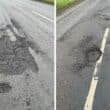Naming and shaming of dog owners who do not clean up after their pets was suggested as one means of cracking down on the unacceptable levels of dog fouling in the new council area.
But members of the Armagh City, Banbridge and Craigavon Borough Council were told that, doing so, could cause difficulties under the Data Protection Act.
The suggestion had been made during the course of a meeting of the new council’s environmental services committee when consideration was given to new Dog Control Orders.
Increased fines, better education, targeting dog owners not equipped with bags to clean up the mess, as well as other suggestions, all came forward as potential deterrents during the course of the debate.
As Armagh I previously reported, there are plans to introduce a standing Fouling of Land by Dogs Order which would see a uniform fixed penalty issued of £80. This is already in place in the old Armagh and Craigavon Council areas but the new Order will take in Banbridge.
During the course of the meeting, Councillor Gemma McKenna said there needed to be a cohesive strategy and education across the Council area regarding dog fouling and littering and she asked whether work on a strategy had started or could be undertaken.
The Head of Environmental Health and Neighbourhood Services (Armagh) said officers had met and discussed the difficulties in achieving a consistent approach, but the proposed Order would be a “first step towards harmonisation” and would be one of the easiest to implement as it would cover the entire Council area.
He explained that consideration would be given to which areas other Orders would be implemented in.
Councillor Gareth Wilson emphasised the importance of moving towards harmonisation as soon as possible and, although there was a considerable issue with dog fouling in the Armagh area, he understood that the public was concerned that this approach could be “too forceful”.
Councillor Wilson said it was difficult to address the situation and it came down to resources and enforcement to get the message across. He understood that the control of dogs was also an emotive issue for some.
The Head of Environmental Health (Armagh) explained that resources were an issue and dog fouling was a difficult offence to tackle. He explained that although there had been enforcement patrols in some parts of the Council area during early morning and late evening, he was unsure how effective this had been in addressing the problem.
He referred to the use of CCTV in the Armagh and Banbridge areas which helped raise awareness and education, saying he believed that a service review was necessary, as well as the pooling of resources to tackle problem areas.
Councillor Glenn Barr agreed that harmonisation was required and referred to the introduction of £1,000 fines in local authorities in England.
He asked how many prosecutions there had been during the past 24 months for offences by straying and non-straying dogs.
Councillor Barr was informed that more fixed penalties would be issued in the Craigavon area as more staff were employed there.
Although he did not have the figures for prosecutions, the officer believed these would be “very small”, as most were paid.
In response to another query by Councillor Barr, it was stated that the suggestion to publicly name those who had been fined could be taken on board in respect of smaller fixed penalties as part of promoting education and awareness of the issue.
Councillor Gamble remarked that targeting the limited resources available did not always address the problem and she enquired whether the increase of the fixed penalty or use of CCTV had helped reduce the number of offences.
She asked whether there were any repeat offenders among those already fined and was told that, in relation to the officer’s own ‘patch’ in Armagh, as present there were more repeat offenders in respect of straying dogs than dog fouling.
He believed that CCTV was effective as it made people realise that offences could be detected, but he recognised that a range of measures would be necessary to have the intended effect.
Councillor McAlinden suggested that a major advertising campaign in schools etc. would be necessary and, since most fouling offences happened in the mornings and evenings, perhaps officers should be deployed at those times.
Councillor McKenna said that the summer months were now approaching when the key issues of fouling, fly tipping and littering were more prevalent and she enquired as to the possibility of compiling a strategy in terms of education, resources and fixed penalties, over the coming months.
The Head of Environmental Health (Armagh) said that although he accepted fouling offences were largely committed during the mornings and evenings, he explained that if officers were visibly present during those times then the number of penalties being issued was lower, as offences were difficult to witness.
He believed that press releases and educational awareness through the dog warden service was helping to address the problem, and suggested that fly tipping and littering could be included under the umbrella of the Clean Neighbourhoods Act which officers had discussed a strategy on.
It was explained by the Director of Environmental Services (Banbridge) that, in his area, the approach taken had been that a straying dog was very likely to foul in a public place, whereas most of those who walked their dog on a lead were likely to clean up after it.
He referred to the zero tolerance strategy on straying dogs where the owner was issued with a fixed penalty with no warning.
But he cautioned that naming offenders publicly, as suggested by Councillor Barr, would be difficult under the Data Protection Act.
The officer did suggest that regular press releases could be issued with details of how many fixed penalties were issued in a particular area which would help raise public awareness of enforcement action.
Councillor Keith Haughian suggested that the small number of prosecutions for dog fouling should not be publicised as it would send the wrong message.
But he agreed with Councillor Barr’s remarks that the Council should be investigating what worked in other local authorities, as the £80 fixed penalty was still not effective.
He suggested taking the opportunity to consider other deterrents and target resources towards public parks and dog owners, including those not carrying disposal bags.
Alderman Burns agreed with inspecting public parks and helping the public be more prepared and he suggested that officers should provide disposal bags on site, as was the case on the towpath at Scarva.
It was pointed out that the consultation related to declaring a Dog Control Order for the Council area and that the fixed penalty of £80 had already been agreed by Council and was the maximum amount according to the Department.
It was agreed, on the proposal of Councillor McAlinden, seconded by Councillor Beattie, to the proposed approach to implementing Dog Control Orders, including the consultation on ‘The Fouling of Land by Dogs (Armagh City Banbridge and Craigavon Borough Council) Order 2015’.
Read more news:
Tesco site in Armagh to be divided into retail units
County Armagh man forced to pay back £20k of benefits or face jail time
Armagh pharmacist sentenced to 12 months behind bars
68-year-old woman robbed in hospital car park
Armagh and Newry General Election: Who will you vote for?
Football fans blamed for attack on Portadown bar



